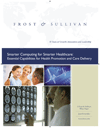
Industry transformation relies on information technology capabilities that embrace interoperability, resilience and efficiency. Progressive organizations are moving quickly to adopt Smarter Computing, a strategic framework for creating the IT environments that are essential to healthcare transformation. Smarter Computing supports broad IT trends for increased focus on unstructured data and systems that sense, adapt and learn. The healthcare industry shows unparalleled promise as new ideas and clinical advances emerge at an accelerated pace. Continued progress depends on positioning IT as an essential partner for process improvement and business model innovation.
Download: Smarter Computing for Smarter Healthcare (.pdf, 10.047 KB).
Download from eHealthNews.eu Portal's mirror: Smarter Computing for Smarter Healthcare (.pdf, 10.047 KB).
This report was developed by Frost & Sullivan with IBM assistance and funding. This report may utilize information, including publicly available data, provided by various companies and sources, including IBM. The opinions are those of the report's author and do not necessarily represent IBM's position.